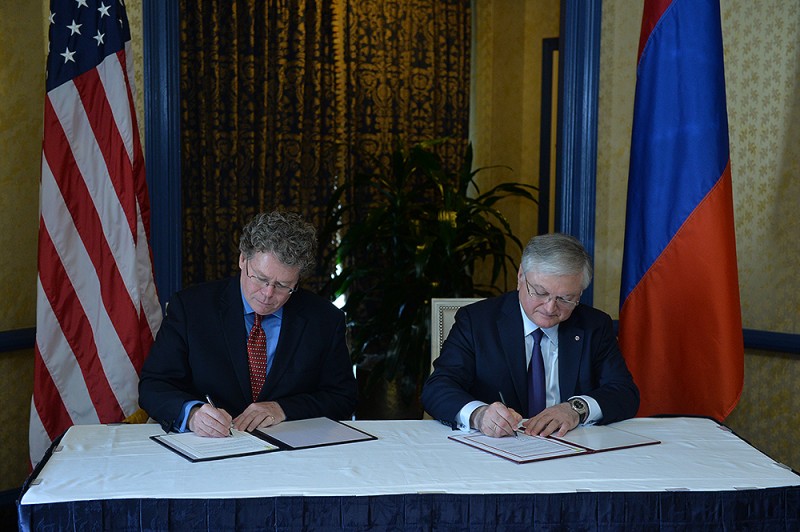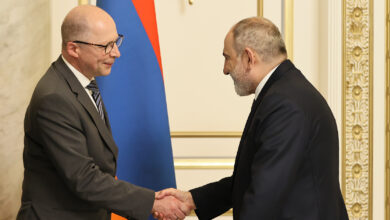Economics
Chairman Royce, Rep. Pallone welcome US-Amenia Trade & Investment Framework Agreement

House Foreign Affairs Committee Chairman Ed Royce (R-CA) and Congressional Armenian Caucus Co-Chair Frank Pallone (D-NJ) were among the first Congressional leaders to welcome the May 7th signing of the U.S.-Armenia Trade and Investment Framework Agreement (TIFA), a longstanding policy priority for the Armenian National Committee of America (ANCA).
Chairman Royce immediately tweeted “I’m pleased the US and #Armenia have signed a Trade and Investment Framework Agreement,” welcoming the measure which will establish a United States-Armenia Council on Trade and Investment to address bilateral trade and investment and related issues and examine ways to strengthen the trade and investment relationship between the two countries.
Congressman Pallone explained, “The Trade and Investments Framework Agreement signed between the Republic of Armenia and the United States represents our shared commitment to mutual prosperity. With this agreement, I am certain that the United States and Armenia will continue to focus on our shared trade and investment interests. Armenia has always been a proud ally of the United States and I am pleased that we have made progress that will support workers in both of our nations.”
The ANCA, which has long worked with the American Chamber of Commerce in Armenia, Armenia-based U.S. businesses and Armenian American community groups, welcomed the move and immediately called for further expansion of U.S. -Armenia economic relations through the negotiation of a bilateral treaty ending double taxation on businesses and investments.
In a fact sheet shared with Congressional leaders, the ANCA outlined the benefits of a U.S.-Armenia Tax Treaty, as well as the costs of the status quo, an outdated an obsolete Soviet-era agreement. The text of the ANCA Fact Sheet is provided below.
The ANCA has launched an online advocacy campaign to Treasury Secretary Jack Lew, urging him to begin preparations for a U.S-Armenia Tax Treaty and alerting Members of Congress about the benefits of such an accord. To take action, visit:
ANCA FACT SHEET: U.S.-Armenia Double Tax Treaty
The Administration should support American investors and strengthen mutually-beneficial U.S.-Armenia economic relations by responding favorably to Armenia’s longstanding offer to begin negotiations on a Double Tax Treaty.
Benefits of a Double Tax Treaty:
— A U.S.-Armenia Double Tax Treaty would establish a clear legal framework for investors and individuals that have business activities in both jurisdictions, preventing double taxation and facilitating the expansion of economic relations.
— A Double Tax Treaty would help reinforce the friendship of the American and Armenian peoples, anchoring Armenia to the West, and providing Yerevan with greater strategic options and independence in dealing with regional powers.
Costs of not having a Double Tax Treaty:
— The lack of a working U.S.-Armenia Double Tax Treaty hinders the growth of U.S.-Armenia economic relations.
— The lack of a Double Tax Treaty creates legal uncertainty that deters potential U.S. investors, diverts investment flows, and disadvantages American businesses.
— Inaction on a Double Tax Treaty, nearly 25 years after Armenia’s independence, sends the wrong message to potential investors and other economic stakeholders.
The 1973 U.S.-U.S.S.R. Treaty is Outdated and Obsolete
— The outdated forty year-old 1973 U.S.-U.S.S.R. Tax Treaty is recognized by the U.S. but not Armenia. Yerevan has repeatedly sought to replace this obsolete accord.
— Even by 1970s standards, the Soviet tax treaty was a limited agreement between two hostile superpowers. Its current legal status remains unclear and its terms are inadequate to the needs of present-day U.S.-Armenia relations. While investors have found ways to adjust to its inadequacies, the existing system of foreign tax credits and deductions is not consistent with any accepted tax or accounting system.
A Standard Bilateral Economic Accord Among Friendly Nations
— A Double Tax Treaty is a baseline treaty for trade and investment. Other accords may improve aspects of the business environment but are no substitute for this treaty.
— A Double Tax Treaty is not a “benefit/privilege” conferred by either state on the other. It is a basic amenity of global commerce that responsible states adopt to promote predictability, efficiency and transparency in taxation. It represents a hallmark of good, open, transparent government.
— The U.S. has Double Tax Treaties with many small countries, including Estonia, Jamaica, Lativa, Lithuania, Malta, and Slovenia.
— Armenia has Double Tax Treaties with many advanced countries, including Austria, Belgium, Canada, China, France, Italy, the Netherlands, Poland, Russia, and the United Kingdom.
A Simple and Straightforward Negotiating Process:
— Negotiating a Double Tax Treaty between the U.S. and Armenia should be relatively straight-forward. It would be, in great measure, an “off the shelf” treaty, not requiring a great deal of time or effort to research, tailor, negotiate or implement.
— A U.S.-Armenia Double Tax Treaty would likely largely follow the U.S. Model Income Tax Convention of 2006, updated by more recent features of U.S. tax treaty policy such as provisions for mandatory arbitration.
— Armenia has broad experience in negotiating tax treaties.
The President’s Promise to Foster Armenia’s Growth through Expanded Trade
— President Obama pledged during this 2008 campaign to “help foster Armenia’s growth and development through expanded trade and targeted aid, and by strengthening the commercial, political, military, developmental, and cultural relationships between the U.S. and Armenian governments.” A Double Tax Treaty would represent a meaningful step toward honoring this pledge.








